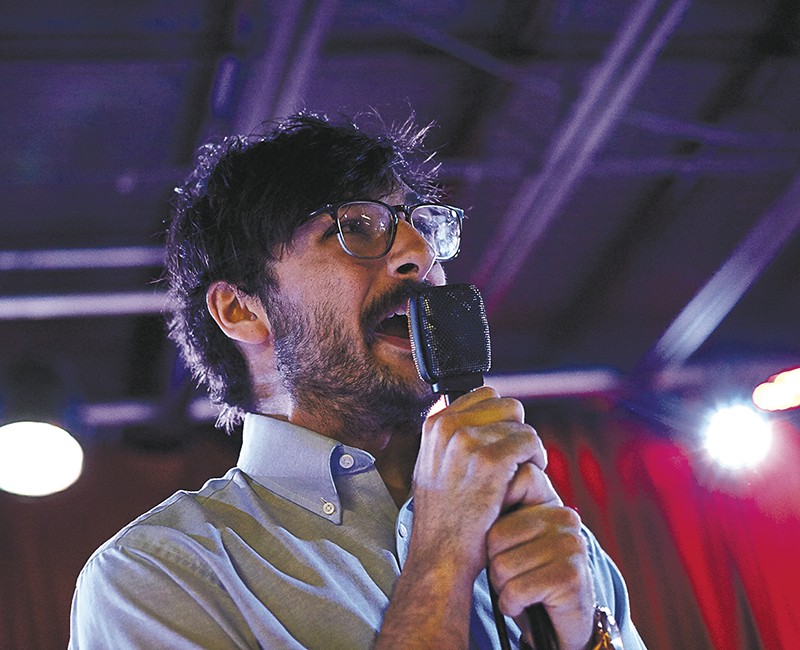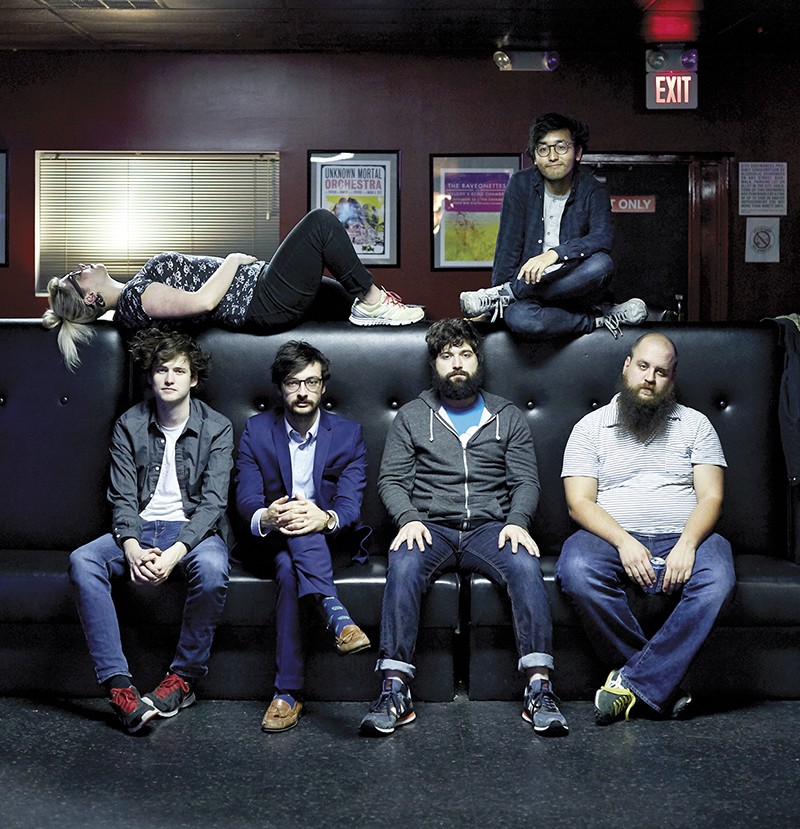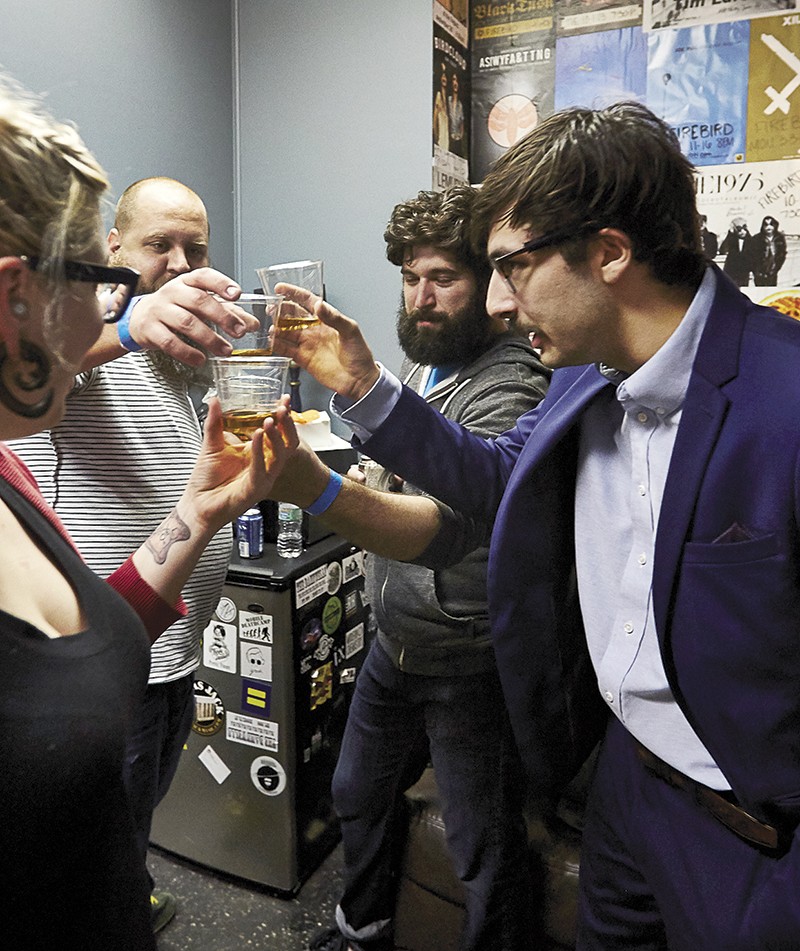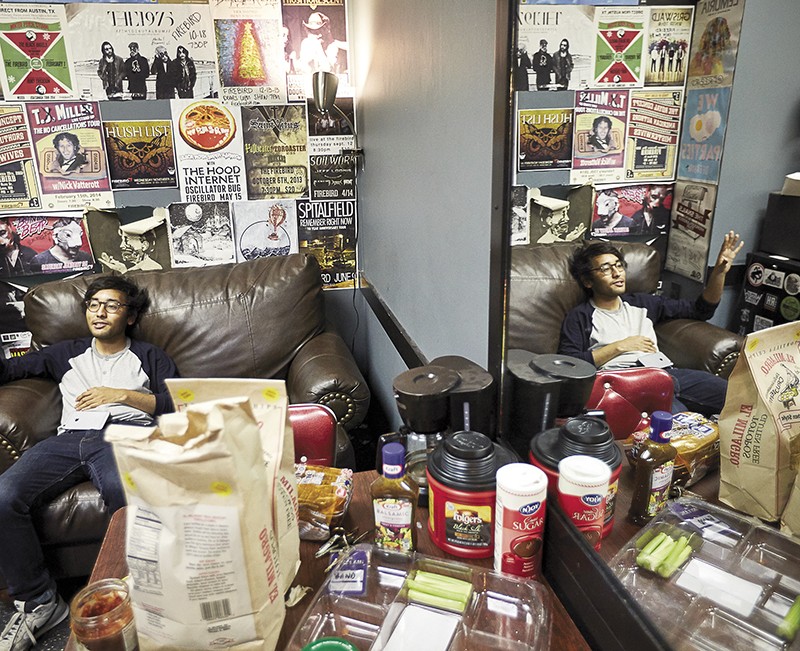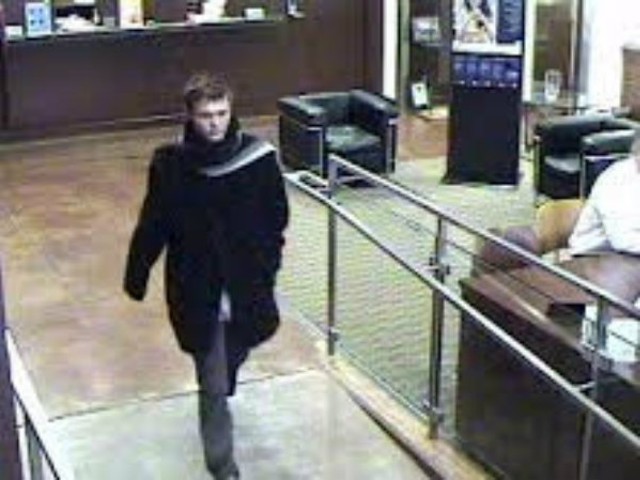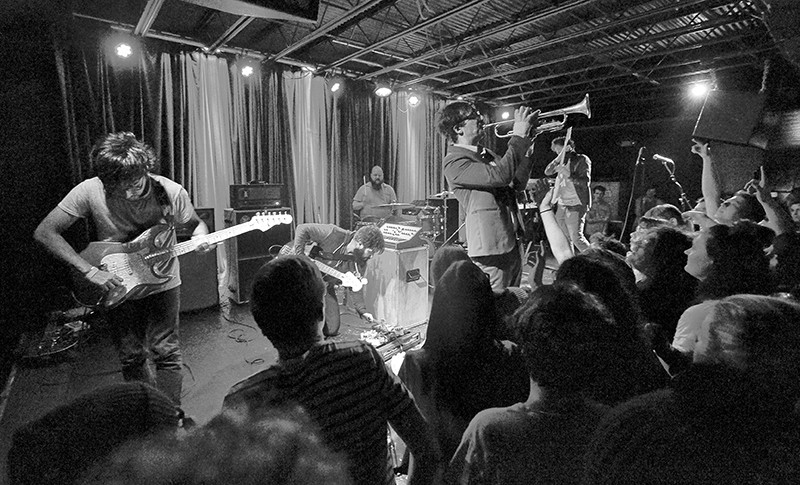
There's a dissonance between the music St. Louis quintet Foxing makes and the reaction it elicits from an audience. The group plays introspective, artful indie rock with classical flourishes, but to the sold-out crowd of 450 at the Subterranean music venue in Chicago, Illinois, Foxing may as well be playing pop punk or tough-guy hardcore. In eloquent terms, the audience is losing its shit.
The attendees sing along loud enough to drown out the thousands of watts of power pushing singer Conor Murphy's voice through the PA system. Some even jump on others' backs to mirror words directly into the singer's face. When Murphy blares out instrumental climaxes on trumpet, fans have an almost Pavlovian response to lift their cell phones and document the moment. During the closing number, Murphy trustfalls into the crowd while guitarist Eric Hudson drops his guitar into the audience, allowing them to share in the cacophony.
It's a sight to behold, but not a rare one on Foxing's autumn tour. A similar scene took place the previous evening in Grand Rapids, Michigan. The following day the spectacle repeats in Minneapolis, Minnesota. A YouTube search displays stage-diving in Austin, Texas, crowd surfing in Gainesville, Florida, and an audience storming the stage in New York City. All this for a band frequently described as ambient and often compared to notoriously tame groups like Explosions in the Sky and American Football.
"I don't know why people go absolutely nuts," says Foxing's bassist Josh Coll, 27. "Most of us come from the world where head-nodding is a sign of respect, so it's always a little bit weird when people go really crazy. At the same time, I'm not going to say that it's not sick."
"I think in my head I would prefer that people just stand there and watch, but it's so intoxicating to be in the midst of people screaming the lyrics," says Murphy, 23, the band's singer and trumpet player. "It's so validating to know people didn't just come here knowing the band; they came here loving these songs and knowing every line.
"That rowdiness is part of this weird collision of pop punk and emo and indie rock," Murphy continues. "The same kids that listen to punk bands like the Wonder Years and Modern Baseball come to see us and act like they would at those shows. At the end of the day, I think it's great. I feed off it."
That aptly described "weird collision" has been marketed as the "emo revival," a term for modern bands influenced by groups from the 1990s who used vulnerability as a form of rebellion. Originally labeled "emotional hardcore," and later shortened to "emo," these bands make urgent music that is a far cry from the alternative goth rock often associated with the genre (Fall Out Boy, My Chemical Romance).
Today, Foxing is considered one of the primary bands in the emo-revival scene. The quintet is not only a big fish in this small pond, but it's also the weirdest, most eclectic fish in the national stream. Far from a by-the-book emo band, Foxing's only direct musical connections to the genre are Murphy's occasionally frail voice and guitarists Eric Hudson and Ricky Sampson's penchant for clean tones.
The band's lyrics, though, co-written by Murphy and Coll, trade between poetic vagueness and brutal honesty. The more direct the sentiment, the more heartbreaking. In one of the band's most beloved songs, "The Medic," Murphy sings unguarded admissions such as, "She says you don't love me you just love sex," before a desperate but relatable chorus of "I want to be loved."
The same openness that informs the band's lyrics fuels its interactions with fans. On Foxing's Tumblr page, band members field questions about everything from gear and tour dates to song meanings and influences. Recently the band addressed an accusation that the song "Rory" is misogynistic, resulting in a lengthy, impassioned response from Coll. Even more recently, the band posted a photo of lyrics from its song "Den Mother" tattooed on a fan's arm.
That diehard fanbase is beginning to develop into something resembling conventional, measurable success. The week after Foxing's sophomore album, Dealer, was released on October 30, it peaked at No. 20 on iTunes' Alternative Albums chart and ranked 24th on Billboard's list of Top Independent Albums.
The band credits a community of loyal show attendees and Internet-savvy music obsessives. "When our first album came out, the major players in the music industry didn't care," says Murphy. "But people online did, and they were eager to tell their friends about this band nobody has heard of. That branched out and all their friends became the first people to hear about us.
"Even to this day there are still so many people who latch onto this idea that we are this band that nobody knows about. Something I love about Foxing is that people think it's this secret and they're the only ones that get it."
The bio portion of Foxing's Bandcamp page reads: "Foxing is a band. Someday Foxing won't be a band." The de facto motto is both fatalistic and stoic — and has the benefit of being demonstrably true.
The seeds of Foxing were sown in 2010 when Josh Coll met Conor Murphy. Coll and Murphy had more in common than similar musical tastes. For starters, both joined the St. Louis music scene at young ages.
At twelve Coll moved from Greeley, Colorado, to Ballwin. At fourteen he began playing bass in dance-punk band the X and the O, which later morphed into St. Louis indie-pop darlings Team Up!! Raised in St. Charles, Murphy had a similar musical trajectory. When he was twelve, he became bassist for Torchlight Red.
The pair's paths crossed when Torchlight Red played a show with Coll's former band, Hunter Gatherer.
"Josh and I started talking about the local music scene," Murphy remembers. "The bands we looked up to were breaking up or moving or becoming inactive, and my generation of people wasn't doing a good job of taking over, my own band included. It led me to think more about taking things more seriously."
Shortly afterward, Coll joined the army and Hunter Gatherer disbanded. Deployed in Afghanistan, Coll kept recalling his conversation with Murphy. He dreamed of starting another band. "I needed a light at the end of the tunnel." He was still overseas when he asked Murphy to help him do it.
And so when Coll returned to St. Louis in August 2011, he and Murphy recruited former Hunter Gatherer drummer Jon Hellwig and guitarist Matthew Piva. Along with guitarist and singer Jim Fitzpatrick, the first incarnation of Foxing recorded three songs that would become the Old Songs EP in 2012.
(Historically, this is where my personal full-disclosure statement would be due. I worked with Foxing as the producer of the Old Songs EP as well as its subsequent album, The Albatross. We do not currently have a business relationship, but have remained friendly.)
With the recording complete, Foxing paused for a semester while Murphy studied audio engineering at Regent's University in London. Before he could return, though, guitarists Piva and Fitzpatrick both left the band.
"I kind of lost my mind a little bit," Coll says. "I was holding on to this idea that I was going to come home, and we're going to start this awesome thing and hit the ground running."
Across the Atlantic Ocean, Murphy initially assumed the band was over — until something changed his mind. "One day I showed the finished mix of the song 'Friendly Homes' to this girl I kind of had a crush on," he recalls. "She started crying while listening to it. I'd never been in a band anybody actually cared about, especially a stranger, and it was like, 'This seems important.' So I hit up Josh and said, 'When I get back, let's do it.'"
The revitalized band joined up with guitarists Ricky Sampson and Tommy Pini. The quintet finally began playing shows and writing new material, but tensions rose between Pini and the rest of the group. Two weeks before Foxing's first tour — and in the middle of recording The Albatross — the members asked Pini to leave the group.
"That was the hardest thing for me to do," says Murphy, who grew up with Pini. "Tommy and I are on good terms now, but it's always going to be a thing where we kicked him out of the band, and it'll never be that he decided to leave."
With a handful of Midwest gigs looming, the band looked to Eric Hudson, who had played guitar in Murphy's former band Torchlight Red. Then a student at Webster University studying jazz guitar and audio production, "I wasn't passionate about it at all," Hudson says. "I had seen Foxing play before. I was impressed, but at the time they actually just made me feel jealous and even more down about myself. I had an audio class with Conor, and one day he mentioned they might need a guitar player and asked if I would be interested. I encouraged them to try to work it out with Tommy, but yeah, I'd be interested."
The current (and likely final) cast of Murphy, Coll, drummer Jon Hellwig, and guitarists Ricky Sampson and Eric Hudson embarked on a two-week tour in the spring of 2013, playing songs for which Hudson had written the guitar parts mere days beforehand.
At the final show in Kansas City, the band crossed paths with Keith Latinen from the band Empire! Empire! (I Was A Lonely Estate). Latinen also runs Count Your Lucky Stars, a record label often considered a pioneer of the emo revival.
"We were playing a venue called Satan's Gay Acid Bath," Murphy recalls. "It was this weird shed that was just packed out with kids that were going nuts and literally hanging from the rafters. Right when we got out of there, Keith asked if we wanted to put out a record on his label. We talked about it in the van for about 30 minutes, and it was like, 'What else are we going to do? What else would we be holding out for?'"
Foxing finished The Albatross with a newfound energy, but initially didn't gain much traction. The band had joined Count Your Lucky Stars at a strange time. "Right before the record came out, they had fired their press agent," Coll says. "We had spent so much time and put a lot of ourselves in this record, we didn't want it to just disappear."
So Coll himself took on the duties of promoting The Albatross online. "He started worming it into all these blogs, and it spread around Tumblr and Reddit," Murphy says. "There was this huge, organic reaction, like a virus got out."
Foxing's self-produced, self-funded video for "Rory" only increased the momentum. The video helped grab the attention of Pitchfork Media, which said the song "feels like the goddamn apocalypse," and the Huffington Post, with The Albatross ranked No. 5 on its list of "Best Albums of the Year (That You Probably Haven't Already Heard)."
Coll is still dumfounded at the effectiveness of his DIY press campaign. "Everything I did was out of desperation to get people to hear this record," he says. "It became the most insane groundswell of anything I've ever been a part of. Kids were relentless about us online, and then the big players — who already said they wouldn't write about us — knew there was something there. The reverse usually happens, where a tastemaker will say, 'Here's something you should like,' and the just kids follow along."
Meanwhile, Foxing was touring the DIY circuit, winning over fans, and losing money hand over fist. Because Count Your Lucky Stars struggled to keep The Albatross in print, Foxing found itself playing shows without even having records to sell.
Though the band struggled on the road, it began to draw interest from other record labels. Foxing also started talking to manager Joseph Marro, whose roster included You Blew It!, Allison Weiss and his own band, the Early November.
"He liked our music and wanted to help," Murphy says. "There was no pressure. He told us if we liked his advice, maybe we can work together."
Perhaps the most crucial move Marro made was introducing the band to Fred Feldman, owner of Triple Crown Records, a larger label compared to the others sniffing around at the time. The group was won over by Feldman's offer not only to put out its next record, but to re-release The Albatross.
"I thought the album was strong and there was so much room to grow," Feldman says. "Our goal was to get more people to hear the band and get them better touring opportunities."
The latter half of Feldman's mission was realized in October 2014 when Foxing opened for fifteen shows with Triple Crown's flagship act, Brand New. Within months the band went from playing basements to sold-out venues with capacities in the thousands. It was a fitting endcap to two years of touring behind The Albatross.
"We could have stayed on the road," Coll says. "We had great opportunities, but we were going to go crazy if we didn't make another record."
Just west of the newly erected IKEA in St. Louis, a billboard looms over Highway 40. In large print the words "Foxing" and "Dealer" accompany an image from the album's cover: two children in a greenhouse overrun with weeds.
A billboard may seem like a strange marketing tactic in an increasingly shrinking music industry, but Dealer is a massive, grandiose record. The band's sophomore album is a dense, exhaustive document of a group wrestling between self-restraint and self-destruction. It is both ambitious and well-executed, and the amount of effort behind it is audible throughout.
Foxing began to write songs for Dealer while the members were home between tours, but finding it hard to focus amid the distractions of outside life. In addition to making up for lost time in their personal relationships, the members sustained themselves with temporary jobs — mostly food service — while not on the road.
"Everything we wrote was born out of negativity," Murphy says. "When you're at practice you're thinking about your girlfriend or work, and afterwards you're thinking about all the dumb fights you had at practice. Every time you play the song, you're reopening that frustration."
"We tried to write together but it was five different ideas and five different opinions, and we ended up writing these songs that we didn't like," guitarist Hudson says. "I kind of said, 'Hey guys, give me a chance on this. I can write out some arrangements, and we'll go from there.'"
To Hudson, writing songs for Dealer also meant figuring out his role in the band. "When I joined, the music was already written and there wasn't much for me to do," he says. "I've always been more interested in songwriting than playing guitar, so I saw this record as an opportunity to prove to myself and the other guys that I care about this band as much as they do."
The band ended up renting a cabin in Vermont for one month, isolating itself. "I think it was the best days of writing that we've ever had, no question," Murphy says. "There's something about staring into the wilderness and thinking about what was going on in your own head. It was inspiring."
The cabin has a different connotation for Hudson. "When I think of the cabin, I don't think of all this great exploration we did that shaped the record. I think of learning how to deal with my own ego and how to be a contributing member of the band without being an asshole."
At one point, the members started to second-guess themselves. "For a little bit there was this paranoia that nobody would like this album unless we made The Albatross Part 2," Hudson says. "Luckily we did not act on that, but there were a few days where we were backtracking on all the progress we made because of that paranoia."
Back in St. Louis, the members had a month before they were slated to record. "We still had so much to do," Murphy says. "Things got a little hairy because everyone had their ideas of what needed to be changed. Some people had thoughts that we needed to scrap entire songs and turn them into something different. There were only a few things that we all agreed on at the end."
For a producer, the band decided on Matt Bayles, best known for his work with Mastodon and Minus the Bear. "We looked at Bayles' discography, and every record he's been a part of has felt massive," Murphy says. "We were making a conscious decision to write more traditionally with choruses and verses, and we thought we could supplement that by working with somebody whose records are always huge sounding."
The admiration went both ways.
"I liked that they were reaching for something," Bayles says from his Seattle studio, Red Room Recording. "I can appreciate any band that doesn't limit themselves to the expectations of what their past indicates."
In May 2015, Foxing drove to the Pacific Northwest to work with Bayles. "It took a few days for us to figure each other out," Bayles says. "They have their own language with each other, and I had to learn how their word might translate to a different word in my world. After we were able to calibrate our communication, things went really well."
"I liked how he would challenge us," Hudson says of Bayles. "He would ask why we were doing something, not because he didn't like it, but just to make sure we had a reason. He made everyone think. If you can't justify why you're playing something, you start to wonder if it's worth doing."
Once the album was finished, the hypercritical band was still uneasy about what it had made. "I knew that if the band made the record they really wanted to make, it would connect with their audience," Triple Crown Records' Fred Feldman says. "One day, Josh Coll told me he had finally sat down and spent some time listening to the record, and he was very proud of it. I knew then that one hurdle was over."
Dealer is a softer, darker, more grown-up version of Foxing. The simple sentiments that defined The Albatross are replaced with deeper musings on God, sex and guilt. Layers of violins, trumpets and mutilated guitars blur into an obscure haze, serving as the perfect backdrop for Murphy and Coll's most thoughtful, devastating lyrics to date.
The reaction to Dealer has been overwhelmingly positive. Songs were premiered in unlikely places (NPR, the Wall Street Journal), while a stream of the full album debuted via Wired. Notoriously cynical Pitchfork Media gave Dealer a score of 7.8 out of 10; Alternative Press awarded it 4 of 5 possible stars.
"Before, I was so nervous that we weren't even going to finish the record," Murphy says. "Once it finally came out, the nervousness focused on how people were going to take it and what the critics are going to think of it.
"Now I wonder if it has staying power. Will people give a shit about it later? The Albatross has been out for two years now, and people still come to shows because of that album. I don't know if this will be the same thing, and that's where my nervousness is now."
The most disarming track on Dealer is "Indica," a song about Coll's experience in the army. Lyrically, "Indica" touches on a kind of darkness rarely explored in song. Murphy sings solemnly about "kids whose lives I may have taken," the reverb on his voice making syllables echo like shrapnel. The arrangement is chilling in its sparseness. Sampson's hypnotic chordal pattern plays like a twisted lullaby that is jarred awake by Hellwig's militaristic snare rolls.
"Indica" marks the first time Coll has publicly addressed his time in the military, even though it has informed many aspects of Foxing.
"Everything I wrote for The Albatross was directly about coming home from Afghanistan," Coll says. "I didn't want that to precede who I was as a person, and I didn't want it to affect the band, so I hid what I was talking about in metaphor. I was being authentic and inauthentic at the same time.
"There was no part of me that was gung-ho about joining the military," Coll adds. "I was kicked out of my house at eighteen, and I started working two jobs and living with friends. When the crash of 2008 happened, I lost both jobs and everybody moved out of the house where I was living. I reconnected with my parents, and they made it clear that if we wanted to have a relationship, [the army] was something they wanted me to do. It felt like there was no other option. I had nothing."
The band's intense all-in aesthetic comes from a particularly harrowing Christmas overseas. "On holidays, the Taliban would hit us extra hard because morale is low," Coll recalls. "They were shooting rockets at us, and the sirens came on. I was supposed to run to a bunker, but I had become so numb that I didn't even leave my little room.
"I was sitting there feeling very nihilistic, thinking, 'Well, if I go to the bunker, who gives a shit? If a rocket hits the bunker, I'm dead.'"
Coll continues, "I told myself that if I make it out of there, I'm going to do something meaningful, at least to me. I'm not going to sacrifice my days for a nine-to-five job. That hunger is still there, and I never forget that shit."
After returning to St. Louis, Coll struggled with post-traumatic stress. "When I went to a restaurant, I would want to sit with my back to the wall. There's an iPhone ringtone that is the exact same sound as the incoming missile siren. I would hear it in public and tense up. I had a dryer at my house that would screech and sound like a rocket."
Coll's struggles peaked in February 2013, right before the band left on its first tour. "All these little things led to this point where I came very close to killing myself," he admits. "I wrote the letter and went off to do it, but I came back because I didn't like the letter. I just felt like that can't be the last thing I say."
Coll's perfectionism saved his life. His girlfriend, Sarah Moncey, found his suicide note and contacted Murphy. Both were at Coll's house when he returned.
"At that moment I realized how much I had let myself go by not addressing the problems I had," Coll says.
Coll began opening up to friends and family, including Brand New frontman Jesse Lacey.
"He encouraged me to write about my experiences," Coll says. "I started writing things that weren't even lyrics, just a mass of words. It was just an exercise for me to strip away all the pretty words and say what is happening to me and what happened and how I feel about myself because of it."
He shared his words with Murphy, but had no intention of using them for Foxing until a few days into the band's Dealer writing sessions in Vermont. "The day was over and we were winding down," Murphy recalls. "Ricky started playing these chords, and I was reading those words Josh had written. I started pulling phrases out and singing them. In that moment we basically wrote the song.
"It was powerful. All of us were choked up and couldn't really say anything," Murphy says. "Josh and I went outside and I said, 'I want this song to be exactly like that,' and Josh said, 'I want it to be like that too.' From then on, we were constantly trying to hold on to that original thing. It's hard to commit to something that simple and not douse it in shit, but every time we tried to add something, it felt wrong."
Coll still expresses discomfort about "Indica," calling it "a hard song to listen to." But the track, to him, is about accepting his past.
"Some people will appreciate it and some people may have a viewpoint that is askew or ignorant," Coll says. "But it's not for those people. It's for me, and it's for my mom, and it's for my friends, and it's for the people that know what it's like to lose a part of yourself really far away from home."
It is barely 10 p.m. in Chicago. The show is over, but the crowd at Subterranean is still catching its breath after Foxing's dramatic, adrenaline-fueled performance. The members of the band have completely loaded out their equipment, but a line of fans intent on buying the band's merchandise still lingers in the venue. Entrance to Subterranean's later show — a major-label, college-rock act that sold about half as many tickets as Foxing — has to be postponed by at least 30 minutes.
After the show, there is no after-party. There is a hotel lobby, but it is three hours away in order to cut down the next day's travel time to Minneapolis. As Murphy drives the band's twelve-passenger Ford van, complete with trailer, and the rest of the band and crew attempt to sleep while sitting upright, Coll is still in work mode. He puts on headphones and continues editing the video for the Dealer track "Night Channels" on his laptop deep into the single-digit hours.
Foxing is a band, and someday Foxing won't be a band. Until then, Coll is tirelessly dedicated to keeping it afloat.
"I really care about what we do," he says. "It's come to the brink of falling apart so many times, and it hasn't fallen apart. My relationships have been put on the line, my family life has been put on the line, my home life has been put on the line. To think that I should act like I don't care if I lose everything is insane.
"I give a shit about Foxing," Coll says. "It's OK to give a shit. It's not uncool to be passionate about what you do."

